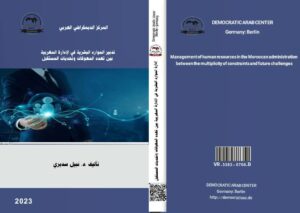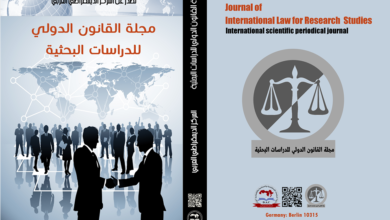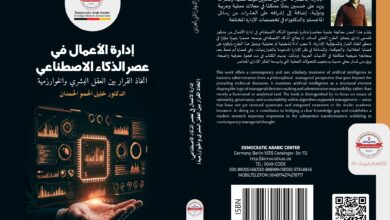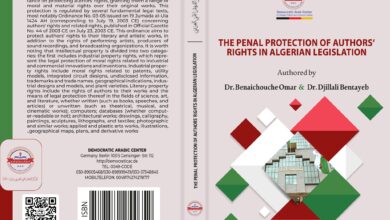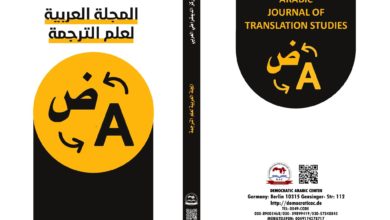تدبير الموارد البشرية بالإدارة المغربية بين تعدد الاكراهات وتحديات المستقبل
Management of human resources in the Moroccan administration between the multiplicity of constraints and future challenges
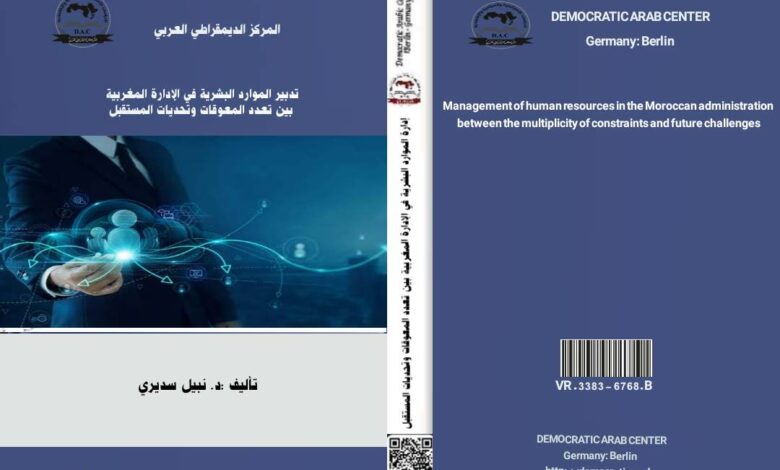
تألبف : نبيل سديري
نسخة “pdf”-
تدبير الموارد البشرية بالإدارة المغربية بين تعدد الاكراهات وتحديات المستقبل
الطبعة الأولى “2023″ –من كتاب: – تدبير الموارد البشرية بالإدارة المغربية بين تعدد الاكراهات وتحديات المستقبل
جميع حقوق الطبع محفوظة #المركز_الديمقراطي_العربي ولا يسمح بإعادة إصدار هذا الكتاب أو اي جزء منه أو تخزينه في نطاق إستعادة المعلومات أو نقله بأي شكل من الأشكال، دون إذن مسبق خطي من الناشر .
تقديم :
إن مفهوم الموارد البشرية اليوم أصبح واسعا ومعقدا، بالرغم من هذا المفهوم فقد تم تعريفه حصرا في توفير القوى العاملة المدربة، ثم توسع هذا المفهوم تدريجيا إلا أنه ظل لفترة طويلة يعتبر البشر بمثابة موارد، وبذلك أصبح العنصر البشري جزء لا يتجزأ من النظرية والتنمية الإقتصادية، وهكذا تحولت فكرة التنمية من الاهتمام بالاستثمار الرأس مالي وإنتاج السلع، إلى الاهتمام برفع قدرات البشر وما يمكن أن تولده هذه القدرات بل الأكثر من ذلك، فقد جاءت نتائج الأبحاث التي ظهرت في نهاية عقد السبعينات من القرن الماضي، وما بعدها مؤكدة لهذه الإتجاهات الجديدة. وبهذا فإن المورد البشري يزداد عن طريق الاستثمار الإنساني، ويتركز هذا الأخير أساسا في التعليم والتدريب إلا أنه يشمل التنمية الصحية والتغذية، يعتبر تدبير الموارد البشرية بالإدارة العمومية المغربية من الرهانات الكبرى التي قد تواجهها، ومن هنا تحاول الوزارة المعنية إيجاد الحلول والسبل الكفيلة للتغلب عليها. وذلك بترشيد تدبير الموارد البشرية من خلال تحسين منظومة الأجور وإجراء تكوينات للموظفين، وتحفيزهم بهدف تطوير وتجويد أدائهم الوظيفي الذي سينعكس بنتائج إيجابية على الأداء الإداري بشكل عام، كما إن تدبير الموارد البشرية لا يتشكل من عملية واحدة فقط بل هو مسلسل من العمليات المترابطة والمتداخلة فيما بينها، ومن بين أهم هذه العمليات المشكلة لسلسلة تدبير الموارد البشرية العلاقة النظامية بين هذه الأخيرة والإدارة، وكذلك عملية التوظيف باعتبارها العملية الإستراتيجية التي يتسنى للإدارة عبرها التغلب على الخصاص الحاصل على مستوى مصالحها من الموظفين، ومن التخصصات والكفاءات التي تساعد على تجويد مخرجات الإدارة في علاقتها بمحيطها الخارجي، إضافة إلى الأجهزة المتدخلة في تدبير الموارد البشرية.
ونظرا لأهمية الدور الذي تلعبه الموارد البشرية في الإدارة العمومية المغربية، إلا أن هناك إكراهات قانونية متمثلة في تعدد الأنظمة والقوانين المنظمة للوظيفة العمومية، نظرا للوضعيات التي ورثها المغرب عن العهد الاستعماري، التي تم إحداثها لإغراء الأطر الفرنسية عن طريق الامتيازات، بحيث ناهزت أنظمة التعويضات 500 تعويضا، اتسمت بالتعقيد وعدم المساواة بين الموظفين، وغموض النصوص التشريعية واعتماد الحلول الجزئية في أغلب الإصلاحات الإدارية التي عرفها المغرب منذ الاستقلال إلى اليوم. بالإضافة إلى الإكراهات الهيكلية المتجلية في البيروقراطية التي أفرزت سلوكات سلبية في التنظيم والتسيير، والتضخم الكمي للموظفين نتيجة التوظيف دون وضع سياسة عقلانية للتوظيف العمومي، مما أدى إلى تضخم عدد الموظفين داخل الإدارة جعل تدبير هذه الموارد أمرا صعبا. فضلا عن الإكراهات المرتبطة بالحوافز سواء المادية أو المعنوية، والتي تؤثر بشكل سلبي أو إيجابي على أداء الموارد البشرية داخل الإدارة، وكذا تحديات مستقبل تدبير الموارد البشرية، المتمثلة في كيفية تطبيق وتطوير الإدارة الإلكترونية وأيضا التخطيط الإستراتيجي الذي يقوم على رؤية شاملة لمكونات الإدارة وإعطاء البدائل والخيارات المتاحة، لمواجهة كل المتغيرات المحيطة بها والاستفادة من نقط القوة وتعزيز نقط الضعف التي تعاني منها، لتحقيق التدبير الجيد والفعال للمورد البشري، والمردودية المتوخاة من هذا الأخير في الإدارة العمومية المغربية.
Abstract
The concept of human resources today has become broad and complex. Despite this concept, it was defined exclusively in the provision of trained manpower, then this concept gradually expanded, but for a long time it considered human beings as resources, and thus the human element became an integral part of economic theory and development. Thus, the idea of development shifted from interest in capital investment and commodity production, to interest in raising human capabilities and what these capabilities can generate. Rather, the results of research that appeared at the end of the seventies of the last century, and beyond, confirmed these new trends. Thus, the human resource increases through human investment, and the latter is mainly concentrated in education and training, but it includes health development and nutrition. The management of human resources in the Moroccan public administration is considered one of the major bets that it may face, and from here the concerned ministry tries to find solutions and ways to overcome it. This is done by rationalizing the management of human resources through improving the wage system and conducting trainings for employees, and motivating them with the aim of developing and improving their job performance, which will reflect positive results on administrative performance in general, and the management of human resources does not consist of only one process, but rather it is a series of interrelated and interrelated operations. Among the most important of these processes that form the chain of human resources management is the systemic relationship between the latter and the administration, as well as the recruitment process as a strategic process through which the administration can overcome the deficiency that occurs at the level of its interests in terms of employees, and among the disciplines and competencies that help improve the outputs of the administration in its relationship with its surroundings external, in addition to the agencies involved in the management of human resources.
In view of the importance of the role played by human resources in the Moroccan public administration, however, there are legal constraints represented in the multiplicity of systems and laws regulating the public service, given the conditions that Morocco inherited from the colonial era, which were created to entice French frameworks through concessions, so that compensation systems approached 500 Compensation, it was characterized by complexity and inequality among employees, the ambiguity of legislative texts and the adoption of partial solutions in most of the administrative reforms that Morocco has known since independence until today. In addition to the structural constraints manifested in the bureaucracy, which resulted in negative behaviors in organization and management, and the quantitative inflation of employees as a result of employment without setting a rational policy for public employment, which led to an inflation of the number of employees within the administration, making the provision of these resources difficult. In addition to the constraints associated with incentives, whether material or moral, which negatively or positively affect the performance of human resources within the department, as well as the challenges of the future of human resource management, represented in how to apply and develop electronic management as well as strategic planning that is based on a comprehensive vision of the components of management and giving alternatives and options Available, to face all the variables surrounding it and benefit from the strengths and strengthen the weaknesses that suffer from them, to achieve good and effective management of the human resource, and the expected profitability of the latter in the Moroccan public administration.
- الناشر: المركز الديمقراطي العربي للدراسات الإستراتيجية والسياسية والاقتصادية

